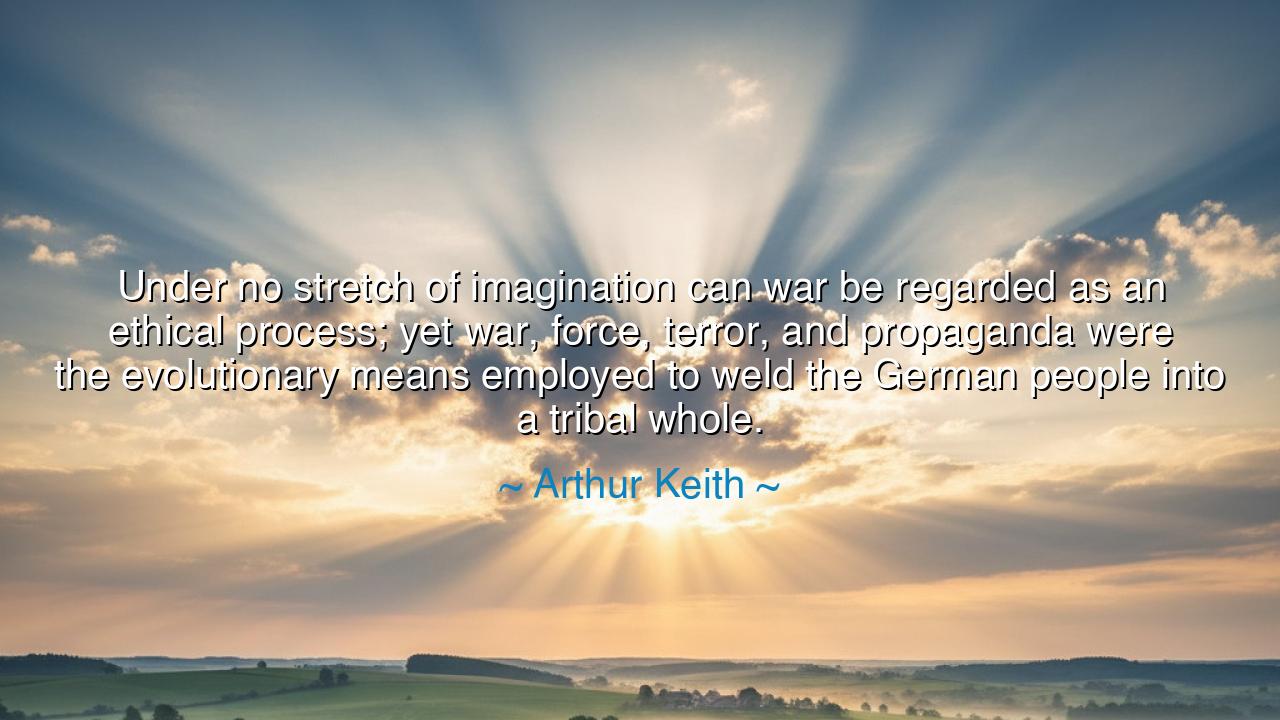
Under no stretch of imagination can war be regarded as an ethical
Under no stretch of imagination can war be regarded as an ethical process; yet war, force, terror, and propaganda were the evolutionary means employed to weld the German people into a tribal whole.






“Under no stretch of imagination can war be regarded as an ethical process; yet war, force, terror, and propaganda were the evolutionary means employed to weld the German people into a tribal whole.” Thus wrote Arthur Keith, the Scottish anatomist and anthropologist, whose reflections on the nature of humanity cut deep into the roots of civilization itself. His words are neither praise nor condemnation alone, but a lament for the eternal paradox of mankind: that the path to unity is so often paved with violence, and the rise of nations built upon the ruins of compassion. He saw clearly that war — that most terrible of human inventions — cannot be justified as moral or good, yet history reveals that through war, force, and propaganda, humanity has again and again forged its sense of identity, its shared destiny, and its tribal cohesion.
The origin of this quote lies in Keith’s work A New Theory of Human Evolution (1948), a study written in the shadow of the Second World War — that most catastrophic conflict in modern memory. He had watched the rise and fall of Nazi Germany, a nation that, through force and terror, through the manipulation of propaganda, had bound its people into a single will. It was a unity born not of virtue, but of fear and fanaticism. Keith, who sought to understand humanity through both biology and history, recognized in this the dark echo of something ancient: the tribal instinct that once ensured the survival of early man, now magnified and twisted by the machinery of modern civilization. His words were a mirror — not of Germany alone, but of the human condition itself.
For from the dawn of time, tribal unity has been both humanity’s strength and its curse. Primitive societies banded together to protect their own, to conquer, to survive. Through conflict, they learned cooperation; through fear, they found solidarity. It was this same instinct, Keith argued, that the German people — and indeed all nations — still carried within them. In times of peace, we speak of ethics, of justice, of love; but when the drums of war sound, the primal bond awakens, and individuals dissolve into the collective. The tribe rises again, fierce and unyielding. Thus, war, though devoid of morality, becomes a crucible through which unity is reforged — a truth as tragic as it is enduring.
History gives proof of this sorrowful pattern. The German Reich, under Hitler’s iron hand, rose not through moral persuasion, but through fear and propaganda — through the deliberate manipulation of pride, pain, and resentment. A nation humiliated after the First World War was told it was chosen, destined, superior. The people, weary of chaos, longed for order; the leader promised it through force. And so, millions became one — not in freedom, but in obedience. What followed was horror beyond imagination, yet Keith’s words remind us that this horror was not alien to humanity. It was humanity’s own shadow, magnified. It was the ancient tribal instinct awakened, stripped of compassion, and armed with the tools of modern power.
And yet, Keith’s quote is not merely an indictment — it is a warning, and a call to wisdom. He shows us that evolution, both biological and social, has left in us the seeds of both creation and destruction. We are born with the need to belong, to unite, to fight for something larger than ourselves. But if that need is not tempered by ethics, by reason, and by empathy, it can lead us down the same path of terror that darkened Europe. The tribal spirit, when purified by love and purpose, builds nations of justice; but when corrupted by hatred and fear, it builds empires of ruin.
So, O listener, learn this lesson well: unity born of violence is a fragile thing. It burns brightly for a time, then consumes itself. The only unity that endures is that which arises from shared dignity and understanding. To lead or to follow blindly under the banners of fear is to surrender one’s soul to the old animal within. The challenge of our age — and of every age — is to evolve not only in body, but in spirit: to transform the tribal instinct that once fueled war into the brotherhood that fosters peace.
Therefore, when you hear the call to division, when you see the rise of those who bind people through hatred, remember Arthur Keith’s wisdom. For though war may build nations, only imagination and empathy can preserve them. Reject the illusion that violence can heal, or that terror can unify. Instead, strive to build communities not of fear, but of shared humanity — for that is the true evolution of mankind, and the only path by which the soul may rise beyond its shadows into light eternal.






AAdministratorAdministrator
Welcome, honored guests. Please leave a comment, we will respond soon